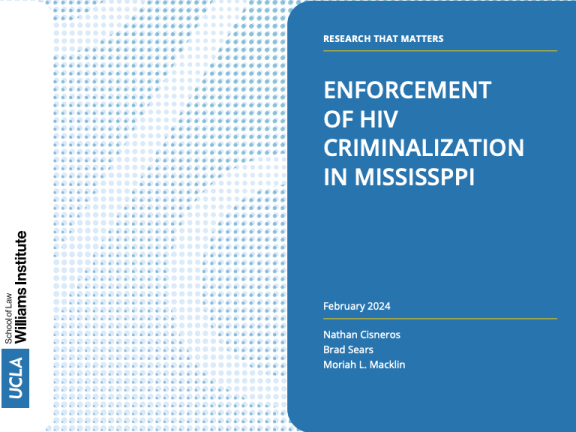Published February, 2024
Enforcement of HIV Criminalization in Mississippi, The Williams Institute, UCLA School of Law (2024)

Using data obtained from the Mississippi Department of Public Safety, this study examines the enforcement of HIV criminalization laws in Mississippi. It documents the legal and legislative history of HIV criminalization in Mississippi and analyzes key trends in the enforcement of the state’s HIV-related criminal laws. Since the enactment of HIV criminalization laws in Mississippi in 2004, enforcement of HIV crimes in Mississippi has continued to the present.
The Williams Institute analyzed data from the state of Mississippi about individuals arrested for an allegation of an HIV-related offense under Section 92-27-14 of the Mississippi Criminal Code. The data were obtained from the Mississippi Department of Public Safety. While previous comprehensive attempts to analyze the level of enforcement of Mississippi’s HIV criminal law identified approximately 15 people charged with an HIV-related crime in the state, our analysis revealed at least 43 people arrested between 2004 and 2021. Given the limited data available, we estimate this to be an absolute minimum number of people arrested for an HIV-related crime in the state.
Highlights from the report:
- Mississippi’s HIV criminal laws disproportionately impact men and Black men in particular.
- Enforcement of HIV criminal laws is concentrated around the state’s capital and near the Gulf Coast.
- Mississippi’s criminal laws do not require the actual transmission of HIV or the intent to transmit HIV.
Summary provided by The Williams Institute
Copyright Information: CHLP encourages the broad use and sharing of resources. Please credit CHLP when using these materials or their content. and do not alter, adapt or present as your work without prior permission from CHLP.
Legal Disclaimer: CHLP makes an effort to ensure legal information is correct and current, but the law is regularly changing, and the accuracy of the information provided cannot be guaranteed. The legal information in a given resource may not be applicable to all situations and is not—and should not be relied upon—as a substitute for legal advice.
